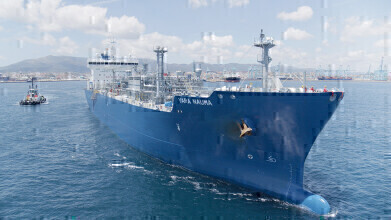Green Energy
Clean hydrogen connection between Southern and Northern Europe
Jun 29 2023
Yara Clean Ammonia and Cepsa have recently joined forces in a strategic partnership, aiming to create the first clean hydrogen maritime corridor linking the ports of Algeciras and Rotterdam. This collaboration is driven by the goal of decarbonising European industry and maritime transport.
Under the partnership, Yara Clean Ammonia (YCA) will supply Cepsa with volumes of clean ammonia. This will enable Cepsa to take the lead in establishing the clean hydrogen corridor, catering to industrial and maritime customers in Rotterdam and Central Europe.
Magnus Krogh Ankarstrand, President of Yara Clean Ammonia, expressed enthusiasm about the partnership, stating, "Yara Clean Ammonia and Cepsa have forged a pioneering partnership to establish a credible and robust supply chain for clean energy transformation in Europe. This partnership will lay a solid foundation for industrial efforts to secure clean ammonia and hydrogen for several downstream applications in Europe while securing the clean transformation goals. We are delighted to be a part of this collaborative initiative."
The partnership between Yara Clean Ammonia and Cepsa will establish a secure, resilient, and cost-efficient supply chain for delivering clean ammonia to Cepsa's industrial and maritime customers in Rotterdam and Central Europe. This collaboration will also enable Cepsa to provide its customers with clean hydrogen using Yara Clean Ammonia's global supply base and logistics network. Consequently, Cepsa will commence the marketing of clean hydrogen and clean ammonia to industrial and maritime customers in Rotterdam and Central Europe.
The CEO of Cepsa, Maarten Wetselaar, emphasised the significance of the agreements, stating, "Today's agreements are a crucial step towards the long-term viability of the Andalusian Green Hydrogen Valley and the implementation of the first maritime corridor of sustainable fuels that will link the South with the North of Europe. Green hydrogen and its derivatives are the fastest, most viable and competitive solution to accelerate the energy transition in heavy transport and ensure energy independence in Europe. The agreements announced today give our project crucial access to markets, customers, and distribution infrastructure: three key elements to unlock the potential of our Hydrogen valley. This is major news for the decarbonisation of European shipping and industry and for the planet."
As part of the alliance, Yara Clean Ammonia becomes the newest partner of the Andalusian Green Hydrogen Valley. YCA and Cepsa will collaborate extensively to establish a robust supply chain for the clean hydrogen corridor. Cepsa plans to construct a new green ammonia plant with an annual production capacity of up to 750,000 tons at its energy park in San Roque, Cádiz, near the port of Algeciras.
The signing of the commercial partnership agreement between Yara Clean Ammonia and Cepsa was witnessed by His Majesty King Felipe VI of Spain and His Majesty King Willem-Alexander of the Netherlands. This agreement marks the establishment of the first clean hydrogen maritime corridor connecting southern and northern Europe, linking the ports of Algeciras and Rotterdam. The initiative aims to accelerate the decarbonisation of industry and maritime transport in Europe.
Yara Clean Ammonia is a subsidiary of Yara International, which operates its largest ammonia and fertiliser plant in the Netherlands. With its strategic location in Sluiskil on the Ghent-Terneuzen canal, Yara's Dutch site serves as a vital transportation hub connecting European inland rivers and railways.
Clean ammonia serves as a sustainable solution for shipping fuel and hydrogen transport, making it an effective alternative for decarbonising maritime transport. Shipping companies are expected to expand their use of clean ammonia as a sustainable fuel to reduce CO2 emissions by 100% starting in 2026. The production and utilisation of clean ammonia, which combines clean hydrogen and nitrogen from the atmosphere, are carbon neutral.
Transporting ammonia is easier and more sustainable than transporting hydrogen, as it can be carried at a higher temperature. Ammonia is transported at -33°C, whereas hydrogen requires cooling to -253°C. After transportation, the clean ammonia can be converted back into hydrogen for distribution, as will be done in the Port of Rotterdam. A terminal is being constructed in Rotterdam for this purpose, facilitating the conversion of clean ammonia into hydrogen and its subsequent distribution via pipelines to Germany, Belgium, Denmark, and the Netherlands.
This commitment to sustainable maritime fuels aligns with the European Commission's Fit for 55 package, which includes the "FuelEU Maritime" legislative initiative. This initiative aims to stimulate the demand for sustainable alternative fuels in maritime transport, reducing greenhouse gas emission intensity by 2% in 2025, 6% in 2030, and 75% in 2050, compared to 2020 levels.
Moreover, the development and use of sustainable fuels contribute to several Sustainable Development Goals of the 2030 Agenda, including affordable and clean energy (SDG 7), decent work and economic growth (SDG 8), responsible consumption and production (SDG 12), and climate action (SDG 13).
Clean hydrogen is projected to account for one-third of the fuel used in global land transport and 60% of maritime transport by 2050. It will play a vital role in storing energy from a 100% renewable electricity system.
Events
IWA World Water Congress & Exhibition
Aug 11 2024 Toronto, Canada
Aug 25 2024 Stockholm, Sweden and online
Sep 03 2024 Mexico City, Mexico
Sep 03 2024 Mexico City, Mexico
Sep 03 2024 San Diego, CA, USA














